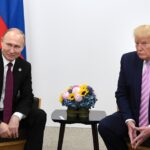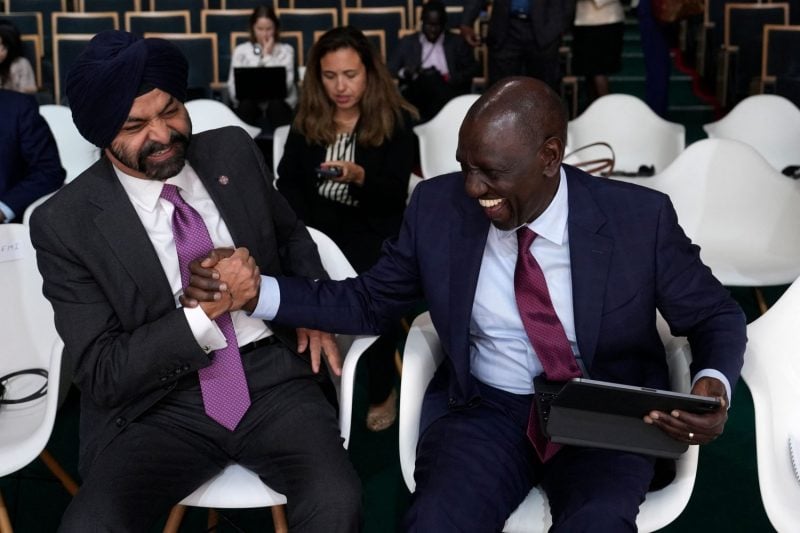Israeli Strikes Pound Gaza in Renewed Military Campaign

Israeli Strikes Pound Gaza in Renewed Military Campaign
Deadly assaults and warnings of famine come as the United States pushes for a renewed cease-fire.
Palestinians check the site of an Israeli strike in Jabalia, Gaza, on May 14. Bashar Taleb/AFP via Getty Images
Welcome back to World Brief, where we’re looking at deadly Israeli strikes in Gaza, Syrian President Ahmed al-Sharaa sipping tea with U.S. President Donald Trump, and a 90-day pause in the U.S.-China trade war.
Mass Casualties Across Gaza
Israel ramped up its military campaign in Gaza on Wednesday, launching a barrage of airstrikes across the territory despite mounting international pressure for Israel to reestablish a cease-fire with Hamas. At least 70 people were killed, including nearly two dozen children, according to the Gaza Health Ministry. Some 50 fatalities were recorded in the Gaza city of Jabaliya alone.
Welcome back to World Brief, where we’re looking at deadly Israeli strikes in Gaza, Syrian President Ahmed al-Sharaa sipping tea with U.S. President Donald Trump, and a 90-day pause in the U.S.-China trade war.
Mass Casualties Across Gaza
Israel ramped up its military campaign in Gaza on Wednesday, launching a barrage of airstrikes across the territory despite mounting international pressure for Israel to reestablish a cease-fire with Hamas. At least 70 people were killed, including nearly two dozen children, according to the Gaza Health Ministry. Some 50 fatalities were recorded in the Gaza city of Jabaliya alone.
There is “no way” that Israel will halt its offensive in Gaza before Hamas is defeated, Israeli Prime Minister Benjamin Netanyahu vowed on Tuesday. Instead, he said Israeli forces were just days away from a promised escalation. After his announcement, Israel struck a hospital in the southern Gaza city of Khan Younis to target Mohammed Sinwar, the brother of late Hamas leader Yahya Sinwar, who was killed by Israeli troops last October. Israel has tried to assassinate Mohammed several times over the past few decades. It is unclear if Mohammed survived Tuesday’s attempt.
Wednesday’s strikes come as Washington tries to secure a new cease-fire deal between Israel and Hamas. After talks with the Trump administration, Hamas on Monday released an Israeli American hostage in what the group said was part of “the steps being taken to achieve a ceasefire” and a gesture of goodwill ahead of U.S. President Donald Trump’s three-day Persian Gulf tour. After concluding his first stop in Saudi Arabia, Trump on Wednesday arrived in Doha, Qatar, where U.S. envoys Steve Witkoff and Adam Boehler have been holding cease-fire talks with a high-level Israeli delegation. The talks have not yet yielded results, however, and appear to be deadlocked.
Fear of a looming famine in Gaza has also raised new concerns about Israel’s military escalation. A new Integrated Food Security Phase Classification report found on Monday that nearly half a million Palestinians in the territory are facing possible starvation and are living in “catastrophic” levels of hunger. An Israeli blockade on humanitarian aid entering Gaza is now in its third month, and even some Israeli military officials have told the New York Times that widespread starvation is imminent if aid deliveries aren’t restored within a few weeks.
“Now, as needs reach their highest, the threat of a new military offensive looms—one that could force nearly the entire population into the shattered remnants of Rafah,” said Kate Phillips-Barrasso, the vice president of global policy and advocacy at Mercy Corps. “This would only accelerate the spread of disease and hunger, with thousands crammed into unsafe shelters or left completely exposed, competing for what little food and resources remain.”
Today’s Most Read
- Modi Has Changed India’s Military Doctrine by Anchal Vohra
- Trump Mistakenly Thinks Japan Is a Soft Target by William Sposato
- How the Oct. 7 Attack on Israel Sank the Palestinian Cause by Aaron David Miller and Lauren Morganbesser
What We’re Following
A historic hello. Trump met Syrian President Ahmed al-Sharaa in Saudi Arabia on Wednesday, a day after announcing that Washington will lift sanctions on Damascus “to give them a chance to rebuild.” This was the first time in a quarter of a century that the two countries’ leaders have met, and it signified a major step for Syria to reintegrate itself onto the global stage after decades of isolation under deposed former President Bashar al-Assad.
Over cups of tea, Trump urged Sharaa to normalize relations with Israel and forcibly remove all remaining terrorists from the country. Up until a few months ago, the United States had a $10 million bounty on Sharaa for his role leading the U.S.-designated terrorist group Hayat Tahrir al-Sham, which was previously affiliated with al Qaeda. Turkish President Recep Tayyip Erdogan, who backed the Sharaa-led insurgency that ousted Assad last December, joined by phone.
Easing the trade war. The United States and China officially rolled back their respective tariffs by 115 percentage points on Wednesday, de-escalating a weekslong trade war between the two superpowers. Trump announced the deal on Monday following talks between senior U.S. and Chinese officials in Switzerland over the weekend. The reductions will last for 90 days to allow time for Washington and Beijing to try to reach a new deal; if no agreement is reached, one or both sides may choose to reimpose the high duties.
Gold prices fell more than 2 percent on Wednesday, as rising trade optimism boosted investors’ appetite for risk. And global stock markets marked the start of the agreement with modest increases; the S&P 500 rose around 0.1 percent, while Hong Kong’s Hang Seng index increased around 2.3 percent.
But an easing of tensions hasn’t stopped Beijing from looking elsewhere for economic partners. Chinese President Xi Jinping addressed the Community of Latin American and Caribbean States at a summit in Beijing on Tuesday, during which he pledged a $10 billion development credit line for the region. Analysts say that Xi’s in-person appearance, the first in 10 years, signaled that Beijing wants to challenge U.S. dominance in the Western Hemisphere; China is already Latin America’s largest trading partner, with bilateral trade surpassing $500 billion in 2024.
Factional fighting. Days of intense clashes in Libya’s capital eased on Wednesday after the government declared a cease-fire with armed groups. “Regular forces, in coordination with the relevant security authorities, have begun taking the necessary measures to ensure calm, including the deployment of neutral units,” Tripoli’s defense ministry said, allowing residents trapped in their homes to finally leave.
Fighting ignited on Monday, when factions aligned with Prime Minister Abdul Hamid Dbeibeh and his provisional Government of National Unity killed militia commander Abdel Ghani al-Kikli and defeated the Stability Support Apparatus (SSA). The Dbeibeh-allied 444 and 111 Brigades quickly seized SSA-held territory and consolidated power under Dbeibeh. Now, only one rival faction remains in Tripoli: the Special Deterrence Force, which also engaged in overnight clashes.
At least six people were killed during the clashes that followed Kikli’s death. Experts have warned that prolonged fighting in the capital could draw in rival factions from other areas, potentially exacerbating the conflict after years of on-and-off-again calm.
Odds and Ends
U.S. Health Secretary Robert F. Kennedy Jr., already no stranger to engaging in questionable actions in public parks, has once again courted controversy—this time in a park in Washington, D.C. On Sunday, the cabinet secretary posted photos on social media showing him and his family swimming in Rock Creek during a visit to Washington’s Dumbarton Oaks Park. Health officials warn against dipping in the bacteria-riddled creek, as much of the capital’s sewage flows through it. But that didn’t appear to stop Trump’s leading health advisor, who at one point even fully submerged himself in the poopy stream.
Alexandra Sharp is the World Brief writer at Foreign Policy. Bluesky: @alexandrassharp.bsky.social X: @AlexandraSSharp
More from Foreign Policy
-

Indian Air Force personnel stand in front of a Rafale fighter jet during a military aviation exhibition at the Yelahanka Air Force Station in Bengaluru. A Tale of Four Fighter Jets
The aircraft India and Pakistan use to strike each other tell a story of key geopolitical shifts.
-

A cardinal in a black robe with red sash with hands folded in front of him walks past a stage and steps. Conclave Sends Message With American Pope
Some cardinals had been agitating for U.S. leadership to counter Trump.
-

An illustration shows red tape lines crossing over and entrapping a semiconductor chip. Is It Too Late to Slow China’s AI Development?
The U.S. has been trying to keep its technological lead through export restrictions, but China is closing the gap.
-

A man watches a news program about Chinese military drills surrounding Taiwan, on a giant screen outside a shopping mall in Beijing on Oct. 14, 2024. The Pentagon Fixates on War Over Taiwan
While U.S. military leaders fret about China, Trump has dismissed the Asia-Pacific.








Join the Conversation
Commenting on this and other recent articles is just one benefit of a Foreign Policy subscription.
Already a subscriber?
.
Subscribe
Subscribe
View Comments
Join the Conversation
Join the conversation on this and other recent Foreign Policy articles when you subscribe now.
Subscribe
Subscribe
Not your account?
View Comments
Join the Conversation
Please follow our comment guidelines, stay on topic, and be civil, courteous, and respectful of others’ beliefs.
Change your username |
Log out
Change your username:
CANCEL
Confirm your username to get started.
The default username below has been generated using the first name and last initial on your FP subscriber account. Usernames may be updated at any time and must not contain inappropriate or offensive language.